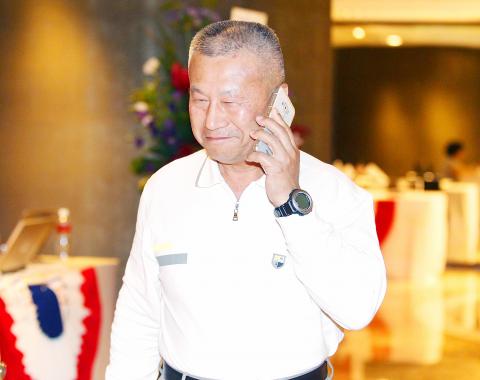The Ministry of National Defense yesterday expressed optimism after the US Senate Committee on Armed Services passed a provision that would re-establish regular visits by US Navy vessels to Kaohsiung or “other suitable ports” and allow the US Pacific Command to “receive ports of call by Taiwan.”
The committee on Thursday voted to allow the exchanges as part of next year’s National Defense Authorization Act, which is to be sent to the full Senate for consideration.
“The move shows that the US values military exchanges with Taiwan. The ministry welcomes any form of partnership that would enhance Taiwan’s national defense capabilities and bring stability to the region,” the ministry said in a statement.

Photo: CNA
Taiwan International Ports Corp (臺灣港務), which is in charge of operations at the nation’s seaports, said that the ministry has its own wharves at some ports.
Should military vessels from other nations need to make stops in Taiwan, they would have to contact the ministry for permission to dock at its wharves, the firm said, adding that military ships would not dock at wharves used by commercial vessels.
The ministry could request the company’s assistance if its wharves cannot accommodate larger warships, the firm added.
Keelung, Kaohsiung, Suao and Taichung ports have military facilities, the Maritime Ports Bureau said.
Bureau Deputy Director-General Lee Yun-wan (李雲萬), who was a student at National Taiwan Ocean University in Keelung when the US Navy’s Seventh Fleet would make ports of call there, said that he recalled seeing a small aircraft carrier enter Keelung Port, although the vessel did not dock.
Only Kaohsiung Port can accommodate large aircraft carriers, which could enter through the second port entrance, Lee said.
He added that Keelung, Kaohsiung, Suao and Taichung ports can accommodate 9,000-tonne guided missile destroyers, such as the USS Fitzgerald, which earlier this month was involved in a collision with the Philippine-flagged cargo container ship ACX Crystal in Tokyo Bay.

MAKING WAVES: China’s maritime militia could become a nontraditional threat in war, clogging up shipping lanes to prevent US or Japanese intervention, a report said About 1,900 Chinese ships flying flags of convenience and fishing vessels that participated in China’s military exercises around Taiwan last month and in January have been listed for monitoring, Coast Guard Administration (CGA) Deputy Director-General Hsieh Ching-chin (謝慶欽) said yesterday. Following amendments to the Commercial Port Act (商港法) and the Law of Ships (船舶法) last month, the CGA can designate possible berthing areas or deny ports of call for vessels suspected of loitering around areas where undersea cables can be accessed, Oceans Affairs Council Minister Kuan Bi-ling (管碧玲) said. The list of suspected ships, originally 300, had risen to about 1,900 as

Right-wing political scientist Laura Fernandez on Sunday won Costa Rica’s presidential election by a landslide, after promising to crack down on rising violence linked to the cocaine trade. Fernandez’s nearest rival, economist Alvaro Ramos, conceded defeat as results showed the ruling party far exceeding the threshold of 40 percent needed to avoid a runoff. With 94 percent of polling stations counted, the political heir of outgoing Costa Rican President Rodrigo Chaves had captured 48.3 percent of the vote compared with Ramos’ 33.4 percent, the Supreme Electoral Tribunal said. As soon as the first results were announced, members of Fernandez’s Sovereign People’s Party

Japan’s strategic alliance with the US would collapse if Tokyo were to turn away from a conflict in Taiwan, Japanese Prime Minister Sanae Takaichi said yesterday, but distanced herself from previous comments that suggested a possible military response in such an event. Takaichi expressed her latest views on a nationally broadcast TV program late on Monday, where an opposition party leader criticized her for igniting tensions with China with the earlier remarks. Ties between Japan and China have sunk to the worst level in years after Takaichi said in November that a hypothetical Chinese attack on Taiwan could bring about a Japanese

MORE RESPONSIBILITY: Draftees would be expected to fight alongside professional soldiers, likely requiring the transformation of some training brigades into combat units The armed forces are to start incorporating new conscripts into combined arms brigades this year to enhance combat readiness, the Executive Yuan’s latest policy report said. The new policy would affect Taiwanese men entering the military for their compulsory service, which was extended to one year under reforms by then-president Tsai Ing-wen (蔡英文) in 2022. The conscripts would be trained to operate machine guns, uncrewed aerial vehicles, anti-tank guided missile launchers and Stinger air defense systems, the report said, adding that the basic training would be lengthened to eight weeks. After basic training, conscripts would be sorted into infantry battalions that would take